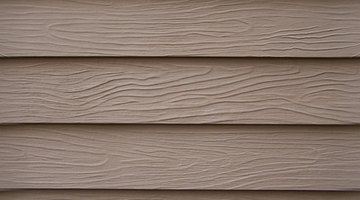Problems With Alcoa Vinyl Siding
Table of Contents
Alcoa vinyl siding is a type of siding produced by Mastic Home Exteriors. Mastic and Alcoa merged in 1989, and adopted the Mastic name in 2009. Alcoa siding is respected in the vinyl siding world. One out of every four homes covered in vinyl uses Alcoa siding.

Even with this popularity, though, there are still some problems with Alcoa siding, and with vinyl siding in general.
Environmental Impact
The biggest problem with Alcoa (now renamed Mastic) siding is its environmental impact. Vinyl is made from PVC (polyvinyl chloride), which is one of the hardest materials to recycle. PVC has also come under scrutiny in the eco-friendly world for its potential to cause cancer and other respiratory problems. Although the presence of vinyl outside the home is likely to have little impact on health, the fact that it's so hard to recycle is a turn-off for many environmentally conscious builders and homeowners.
Price
Alcoa vinyl siding is fairly expensive to install. The Quest 3 series of vinyl produced by Alcoa can cost around $400 per 100 square feet of siding installed. This is more expensive than many other vinyl sidings; the average cost for a vinyl install is $150 to $250 per 100 square feet. The quality of Alcoa products, however, is often higher than cheaper alternatives. Alcoa siding usually has a width of .042 and .045 inches. The ideal thickness for vinyl siding is .040 to .045. The American Society of Testing and Materials (ASTM) requires a thickness of only .035.
Moisture Barrier
Vinyl acts as a moisture barrier against the house. While this is a good thing in many cases, it can be bad for the house if not installed properly. If water seeps behind the vinyl siding, the water can become trapped, and the wall will quickly deteriorate. One of the most common places to see water damage around vinyl siding is at the roof line. If water isn't drained properly, it's often deposited behind the vinyl siding. Moisture also often creeps up at the baseline of the vinyl siding.
Fading
Another problem with Alcoa siding, and any other siding, is sun fading. While many Alcoa siding products contain materials that resist sun fading, it still occurs over time. There's no way to prevent fading, and vinyl siding is extremely hard to paint.
Replacement and Repair
Vinyl siding is prone to damage such as scratches, dents and bumps. Vinyl siding can also melt from heat produced by barbecue grills and even window reflections. Replacing vinyl siding is usually difficult, and color matching is almost impossible.
Insulation
Vinyl siding also produces less insulation than other forms of siding such as cement and wood. Insulation is often placed behind vinyl siding, but it still is usually not enough to match the insulation power of other siding types. This can be a problem in locations with extreme heat or cold.
References
Writer Bio
Brenda Priddy has more than 10 years of crafting and design experience, as well as more than six years of professional writing experience. Her work appears in online publications such as Donna Rae at Home, Five Minutes for Going Green and Daily Mayo. Priddy also writes for Archstone Business Solutions and holds an Associate of Arts in English from McLennan Community College.
Photo Credits
- house siding 3 image by Psycience from Fotolia.com
- house siding 3 image by Psycience from Fotolia.com
More Articles



